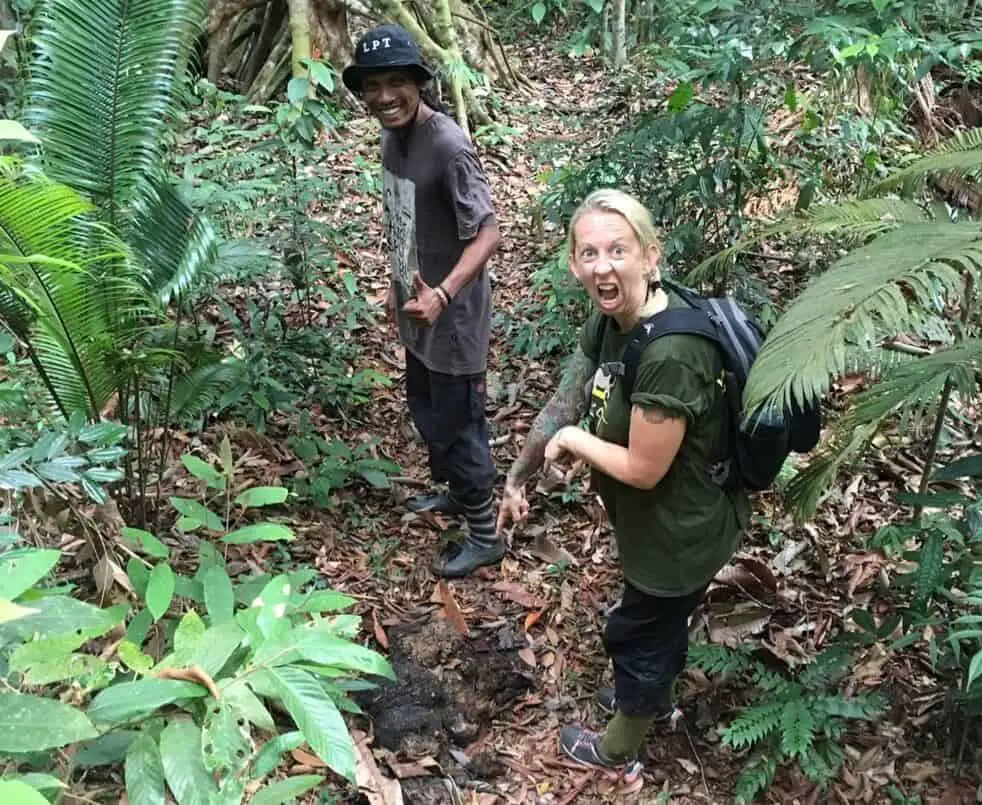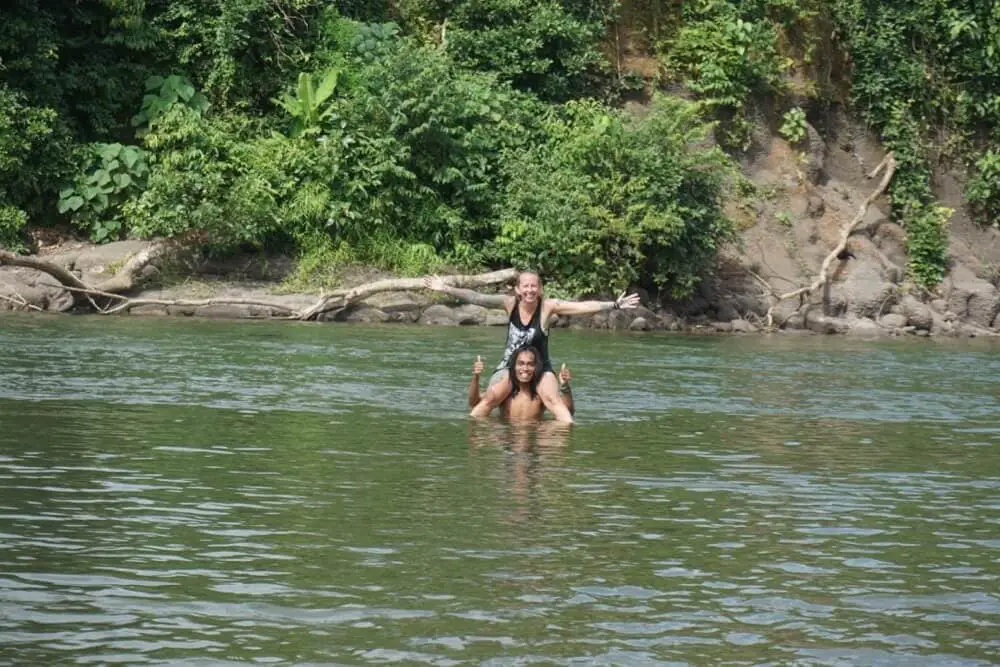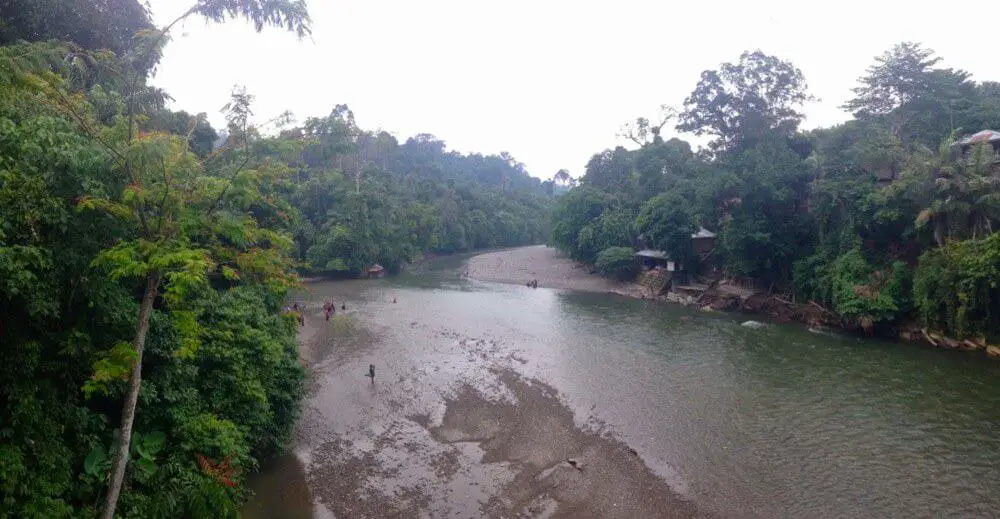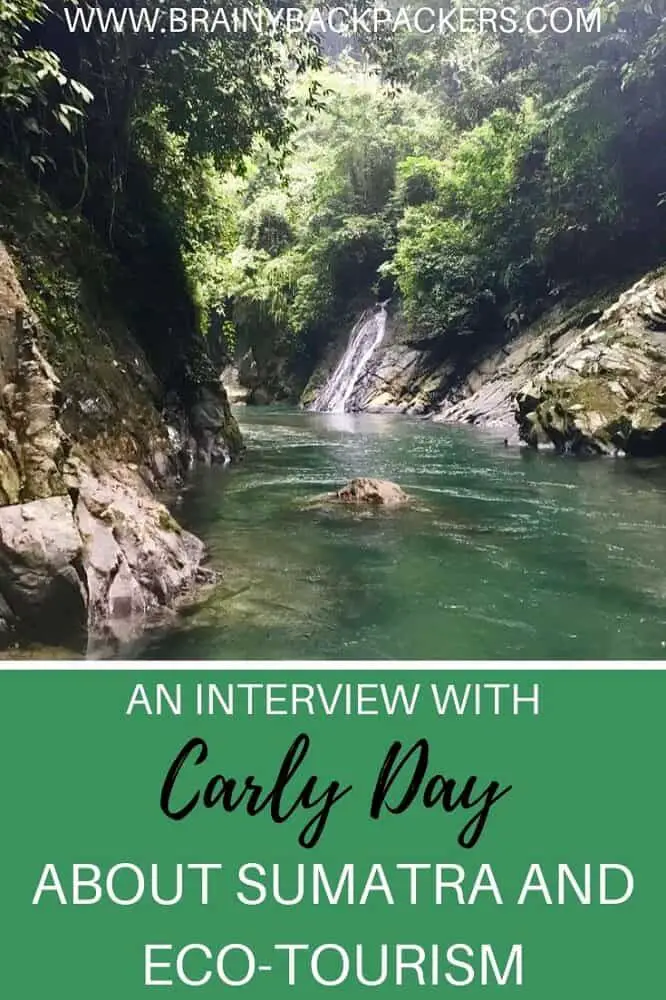To make eco-tourism work out, you need to have the local community on board. Today, I will talk to Carly Day, a life-long animal lover from New Zealand who eventually moved to the jungle in Sumatra to be surrounded by nature and wildlife. Now she is helping the local community of the village she lives in to develop eco-tourism initiatives.
Carly Day has a 12-year-long career working as a zookeeper in New Zealand, specializing in primates. I am looking forward to getting to know her better and to learn about her perspectives on responsible tourism after living in a small Indonesian community enjoying the simple jungle life.
Meet Carly Day
After first visiting Sumatra in 2009 to assist in rehabilitating orphan orangutans, Carly fell totally in love with it. She found herself returning year after year. Finally, in 2016, she had the courage to quit her job, sell everything she had, and flee to the jungle!
Carly met her husband Agung in his home village, Tangkahan, on the Indonesian island of Sumatra where she was living. Agung is from North Sumatra, where he worked as a jungle guide and ranger before they started traveling together.
Both Carly and Agung are infatuated with Sumatra and see the potential in this incredible destination. They want to help others plan their visit and have the time of their lives. That’s why they created their travel blog Exploring Sumatra.
They are both nature lovers and are determined to empower and encourage people to travel sustainably and respectfully – caring for local culture and communities as well as the environment.
Now, I’m eager to ask Carly some questions about responsible travel!

What does travel mean to you?
Agung and I are from different worlds but get the same thrill from traveling. It has changed both our lives, providing us with insight and opportunities we would never have imagined from the comfort of our former lives. The most important thing for us is allowing new places, cultures, and experiences to open our minds and teach us more about life.
For me, traveling to Sumatra got me so far out of my comfort zone that I didn’t want to go back. I realized how uncomfortable I am in the materialistic western culture, and how much joy the simple life can offer, much more than owning a lot of “stuff.”
What does responsible tourism mean to you?
I have lived in Sumatra for three years now, and have the unique benefit of Agung’s insight as a local. We have seen the impacts of tourism on the tiny village that we live in (both good and bad), so we use this knowledge to educate people about how to best respect the culture, economy and natural treasures of the places they are visiting. However, we are particularly passionate about responsible wildlife tourism, as Sumatra’s jungles are what we most adore.

When did you first start to be conscious about the way you travel and the effects your travels have on your destination?
Before Sumatra, I never really traveled much (I thought it wasn’t for me, boy was I wrong!) So I didn’t give it much thought before moving to Tangkahan to live. Agung spent his life in this village, though, so has seen it grow and change from a poor village that relied on logging and poaching to a burgeoning eco-tourism destination that depends on tourists to survive.
For us, it’s the eternal struggle of how to balance the needs of the community and the needs of the environment. Tangkahan is a powerful example of how tourism can turn a community around; they went from destroying their local environment for an income to protecting it. But at some point, when tourism grows big enough, the industry could become a burden rather than a positive thing.
Have you traveled to a specific destination that you found especially sustainable that you would like to recommend to other travelers?
Sumatra has the unique benefit of being relatively unknown within Indonesia, meaning overall, it hasn’t had to face the issues caused by overtourism (except in one or two key spots.)
For us, it’s the best place in the world to see wild orangutans, gibbons, hornbills, and a range of other animals. One of our favorite places to do this is in Batu Katak. This small community is doing a great job of managing rubbish, protecting the rainforest, and offering ethical trekking. You won’t find hordes of tourists here, and the animals are still wholly wild. While there’s no guarantee of seeing an orangutan, you can travel here safe in the knowledge that they don’t feed or compromise these animals for the benefit of tourism. It’s nature at its best.

What do you do to travel responsibly?
We support locally-run businesses rather than those set up by foreigners. We choose local guides, drivers, accommodations, and restaurants, so we know our money is going back into the economy.
We’re also all about the wildlife; we only choose responsible, ethical guides when we go trekking, and would never support anywhere that exploits animals in any way. Where possible, we educate people about ethical ecotourism and support local communities to move away from irresponsible practices.
What are your top 3 advice to travelers that want to travel more responsibly?
Do extra research when seeing wildlife. Many tourists to Sumatra have the best intentions to travel responsibly, but don’t actually know what that means, or get sucked in by the charming words of a local guide who is less than trustworthy but talks the talk. Get on Google, find out what responsible trekking looks like, and choose a guide that doesn’t feed, touch, or get close to wildlife.
Leave your culture at home and act like a local. Just because you might wear a bikini to the beach at home, doesn’t make it acceptable to walk around a small, conservative village in one. Be respectful; if in doubt, cover up.
Ditch the plastic. Indonesia (and most of the world!) has a massive problem with rubbish. Leave a light footprint by saying no to plastic bags, straws, and single-serve packaging while you travel.
See more from Carly Day
Make sure you check out Carly and Agung´s destination blog for more advice on eco-tourism in Sumatra. I know I get super excited to travel to the island and would love to book my ticket right now!
Also, follow their journey and responsible travel tips on social media. You find them on Facebook, Instagram, and Youtube.
Are there any questions you wish I had asked Carly? Shout out in the comments below!
Read next: Mindful travel – An interview with Lucile Hernandez Rodriguez
Pin it for later!

